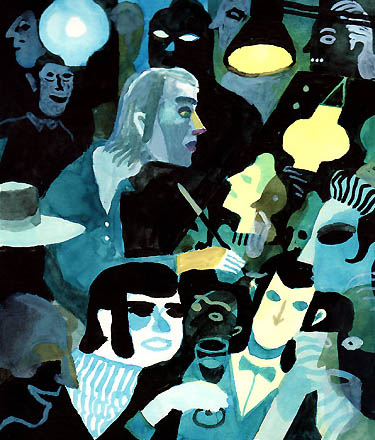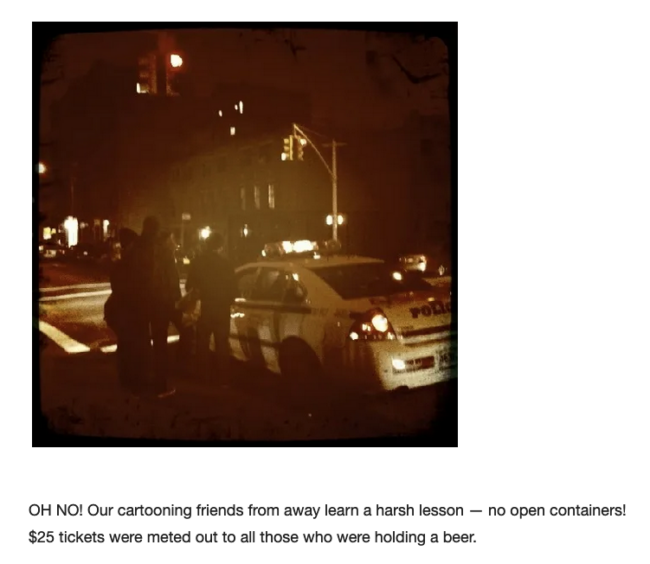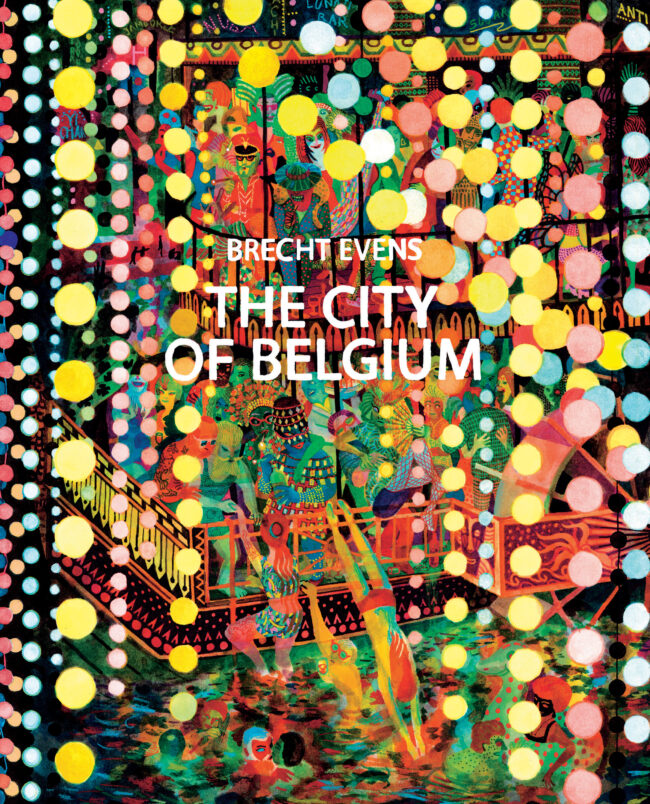
I met Brecht Evens in NYC at Mocca in 2011. D&Q put Brecht, Pascal Girard and me all together in an apartment for a long weekend. It would have been a good sitcom.
Much has been said of Brecht’s unique visual style, but I often think his writing is taken for granted. He writes complexly plotted stories, often with a large cast of well-realized characters. His work is always very funny, but suffused with a heart of cynical kindness.
I feel like with the release of his exceptional new book, The City of Belgium, people will be more conscious of the great writing beneath the dazzling visuals. (But they work together Brecht, I know!)
Over the years, the random late night, drunken, transcontinental emails Brecht and I have exchanged eased off after I quit drinking, so it was nice to have this conversation via email.
I really appreciate Brecht taking the time to go deep and answer a bunch of probing questions with frankness and honesty.
Joe Ollmann: Is it fair to call The City of Belgium a mental health book or a recovery book? There are two characters who are in the midst of mental health crises. Why was that something you wanted to explore?
Brecht Evens: I started writing it just after my own recovery from a mental health crisis, so the recovering was done, thanks to pills and the love of loved ones. I didn't find art to be a huge help when I was in real trouble. About as useful as a cat when you’re drowning. Patiently waiting by the waterside, ready to be petted and fed once you get out.
But the crisis has been good for the art though. It gave me another lens through which to look at people and life in the city, got me into unexpected places and conversations, and these experiences fuel a large part of the book. I think 'mental health book' sounds way more didactic than it is, so let's say that's unfair, before it sticks.
It’s also a book about the convergence of a lot of people, all of whom are in a state of change. Jona is leaving town, trying to get out of a life of petty crime. Vic is fragile and possibly just out of some kind of rehab or mental health facility, Rodolphe is also depressed and in therapy. Buzz is out of prison and ready to get back to criminal activity. A lot of transition going on. Was transition or change on your mind when you set out to make this book?
Yes. I was in a transitory period, newly arrived in Paris and catching my breath from a lot of dark adventure. I suppose it would be hard to make any book about characters who are not going through any changes. In most of my books the protagonists are either meeting entirely new people or old friends they need to catch up with. The story always grows out of these encounters, with the characters unlocking stuff in themselves or revealing themselves in some unexpected way.
The taxi driver intrigues me, they understand a fundamental truth; people don’t necessarily want the truth, they want a good story. What does the character of the taxi driver represent to you? Are they some kind of Charon figure ferrying people to some other level or stage, or am I being too obvious?
I'm sure it's the same for you: first you invent the character and THEN you come up with the Greek mythology reference. I know I wanted the taxi to feel like a magic flying carpet in one of the drawings... Oh and of course it's a giant fish in another one. The taxi driver (TD, so I can skip the pronouns, since I haven't needed to decide what TD is genderwise) is the most expansive talker among a bunch of secondary characters who tell shaky stories and dispense dubious wisdom. It is one of the main ingredients of nightlife, meeting people who's names you forget and who are possibly telling you things that make sense but are mostly telling you something about themselves. TD is first of all a compulsive storyteller, and has fun reinventing TD for every new passenger TD picks up. If TD is inspired by anyone, it is the Warren Oates character in Two-Lane Blacktop.
Vic, Rodolphe, and Buzz are all live-wire, life of the party, unpredictable fun types. They’re capricious and make life interesting, but they make life anxious for the uptight, responsible people around them. Do you think that they’re aware of the anxiety they cause? Do you think they care?
They are very busy juggling the stuff inside themselves, which does not leave them a lot of bandwidth to deal with how others are feeling. It makes them fun to follow around from the comfort of your reading chair, I hope. Many of the characters in the book are entirely expressing themselves, and receiving other people's signals only partially, or scrambled. I haven't decided if that is how I feel about most real people, self included.
Brecht, what happened to you with a red-haired girl in cat-ears and a gingham dress? This character appeared in your book The Wrong Place as well. Is it just a fictitious idyl or based on a real meeting?
I'm not entirely sure. I was very young when I started writing The Wrong Place. Must have just seen some gingham here and some cat ears there and voilà. Art!
It seemed fun and harmless to have cameos from The Wrong Place characters in the new book, and build some bridges to make the fictional big city feel even bigger.
Is Rodolphe a fictional stand-in for Brecht Evens? How is your mental health presently, amidst all of this?
A conversation I had when I was depressed inspired me to write a little tragic-funny dialogue in a notebook. Maybe the first thing I wrote after a long absence of ideas. It had a good friend consoling a depressed guy by telling him he is so much nicer now that he's depressed, that this is the pain of growth, that he used to be such an asshole. The gag is that she keeps insisting on how much of an asshole he was. The dialogue seemed like it had longer story-arc-potential. Once I worked on this longer Rodolphe arc I filled in a lot of his blanks with my own stories, like the one about swimming too far into the lake... It was not my parents waiting on the shore but my former illustration teacher, who loaded my depressed body into her car at some point so I could go get a dose of nature in the beautiful region where she lives. I don't do too much autobiography but some snippets come in handy.
I'm doing very well, endless pandemic notwithstanding (please go get vaccinated, people). I haven't felt lonely because enough people have sat down in my living room and told good stories while drinking good wine. As for losing sleep about the state of the world, my climate panic overrules any pandemic panic. There has been no special lockdown productivity bonus. I am perfectly capable of wasting time at home.
You were something of an enfant terrible when I met you, something of a prodigy. You’re a bit older now, do you find that talent or perhaps confidence in that talent waxes or wanes with experience and aging?
We had such fun in Canada, you terrible old man!
At comic festivals, I don't tend to answer attention and appreciation with quiet humility, unless I'm already very hung over. Festivals only last a few days! I came over in an airplane, from another continent! I want some stuff to happen. It seems less distant, more efficient, and I hope more generous to be a bit loud and not overly diplomatic... It speeds things along with some people, with others it leads to reproachful whispers. Sorry, this whole paragraph was about you calling me an enfant terrible, which... in comics, a 25$ open container ticket earns you a bad boy reputation.

I wouldn't know if my talent has waned but my confidence in it hasn't. Maybe because most people have continued saying nice things, something I expect will change quickly if I were to stumble into more fame. I have some different goals and worries now than I did then. I can't always keep all plates spinning, and I'm spinning a few new plates while some old ones are forgotten and shatter. The main thing is to stay awake and alert. I fail at this a lot, but anytime I don't, something worthwhile happens. I don't think the olds are less able to stay alert than the youngs. Perhaps it's different kinds of triggers, fears, desires, that prod them into that state.
Something you said in your recent Instagram live with D&Q really struck me; “I don’t want to become my own illustrator.” You were talking about the necessity of improvisation for you to be engaged in a project. Your books are very “writerly,” I mean, they’re very well-written, are you scripting before you start drawing? Can you talk a bit about the level of improvisation versus planning goes into one of your books?
Ooh boy, this has been so different for every book. I definitely script before I draw, but some pages are drawn the same day I write them, others years later. The books definitely don't come gushing out of me as finished comic book pages.
Some books require more planning than others, I'm not sure why. Perhaps it depends on how well you know, from the start, what game you're playing. I'm not saying it's good or bad to know this early in the process, but it's definitely faster.
In our job there should ideally be no separation between writing and drawing; it's all storytelling. You take notes, these notes can be words or sketches. You draw a finished page with fancy color inks, but if you're alert while doing it, you keep making storytelling decisions while drawing, instead of only executing a plan, instead of becoming your own illustrator slave. This is not improvisation any more than a writer is improvising while he's typing on a laptop.
Mind you I said 'ideally'. I'm describing good work days here, the ones with little or no email, social media, Netflix, alcohol, chocolate or gossip.
I think that other than one of your very early books done in a traditional pen and ink lifework style, you’ve always worked in your unique painterly style with colored inks, is that correct? What made you eschew a traditional comics approach? Did you come from a fine art painting background more than from comics?
The short answer is my illustration teacher made me eschew it.
And once I eschewed it I started understanding why it had to be eschewed. My parents did their very best to make me understand fine art but I was an unrepentant comics boy until I met teachers who scared me out of it at art school.
(We did a lot of eschewing there.)
Sober, chamomile tea Rodolphe, sensible, toilet paper Rodolphe is a subdued shadow of himself until he possibly ingests drugs absorbed through his shirt, hits a club that was his old haunt and becomes himself again, transforming, removing his clothes, becoming Baron Samedi (death) again. What are your thoughts on sobriety and what it leaves of a “party person?” Or perhaps it’s meant to be more of a commentary on licit pharmaceuticals, prescribed to alleviate mental health issues, make a person stable but can sometimes suppress elements of a patient’s personality?
I don't think Rodolphe becomes himself again, but rather he overshoots the goal and goes into a completely new and dangerous extreme, the way I did when I went from depressed to manic.
The oversimplified version of my mental crisis is that drugs got me in and drugs got me out. Licit pharmaceuticals did well for me after a (long, horrible) while, and did not suppress anything worthwhile I think - there was no longer a 'party person' there to be suppressed. Put me down as a fan of antidepressants, at least the ones you don't get hooked on. I did not like all the godforsaken chamomile tea, but I wasn't liking much of anything anyway.
Sobriety huh... I saw your instagram live and you look peachy fresh and mighty fit, definitely my kind of sober party person. I was going to say that I don't have any experience with sobriety, but that is not the right way to phrase that... I don't touch alcohol when I'm alone and never have when I work, because the ambition-thingy that makes me stay at my desk runs off by the time I'm halfway through a glass. Big problematic unresolved cigarette addiction though.
The character designs in The City of Belgium evoke for me a lot of classical mythological references. Is character design an intuitive process for you, or is there a lot of thought/planning given to the symbology, etc that goes into it?
Intuitive! With due respect for recognizable silhouettes, patterns and colors, and no respect for symbology, though you can take it for a roll in the hay.
Sorry Joe, I don't know what it is about you that makes me write answers like this.
Oh I know; it is your rugged sex-appeal.
I want to ask you a few things about translation. You’re a polyglot who is fluent in English, so it makes sense that you would translate this book yourself. But I think this is the first time you’ve translated any of your books yourself? What made you do that this time?
I did [a] draft in my own eurotrashy english, then Tom Devlin, Megan Tan, the letterer François Vigneault, and me went through it with a fine comb. The main reason for this is that the ‘original’ version of the book was a polyglot jumble with scenes written in dutch, french or english depending on what I read or who I talked to that day.
There’s a lot of wordplay in your books, how difficult is it to translate jokes, or do you change them entirely at times?
Yes, sometimes we change them entirely! We even cut jokes, and add other ones in other places! There are three original-language versions of The City of Belgium. Other language versions start from any one of these, just whichever they feel like, for no valid reason. What a lovely mess.
Last question about translation is regarding physical logistics or re-lettering over pages of elaborate paintings. Did François remove the original lettering or are your pages absent of lettering and text is added in overlays? (Don’t just say: “it’s done on a computer, Grampa!”)
IT'S CALLED A GRAPHICS TABLET JOE OLDMAN! Pardon - the original pages are indeed absent of lettering, then lettered on a separate layer in photoshop, using a graphics tablet. This is too bad, because in an ideal graphic novel the lettering should be done while drawing, during drawing, should BE 'drawing'...
But people speak different languages. And make spelling errors. Removing and replacing painted lettering on paintings is of course a horrible headache. I think Dominique Goblet did sit down and do it, herself, the hard way, for 'Pretending is Lying', but... please no.
My kind of handlettering is already a big thing to ask from an editor, but I insist on it in all languages. François did an expert job on the english version. He must have suffered, or perhaps gained hard-earned zen monk bliss.
You seem to consciously evoke several classical painters/artists throughout the book. Was that merely homage or was there a larger reason behind that?
I never steal - sorry, evoke - just to pay homage, it always has to serve a story purpose, evoke an atmosphere, perhaps make us see things through the eyes of a character, who might have seen the same painting or drawing I did.
Random coincidence very elegantly plays a large part in the book; they all ride in the same taxi, Vic and Rodolphe have the same psychiatrist, all of them are at the same restaurant and later, nightclub. Is it fair to say that random coincidence is almost another character in The City of Belgium?
It's about efficiency, not adding useless complexity by multiplying similar characters and places. All of them taking the same taxi means we can get to know the driver better. Repetitions also create rhythms and motifs, and the simple child-play pleasure of recognizing something. In some cases, like when Jona runs into ALL of his friends at the same time, it is a satisfying over-the-top theatrical thing that doesn't change the reality of the moment - running into some friends who didn't invite you out with them. But random coincidence never drives the plot I think. Stop declaring things characters in my book! Don't make me come over there! Funny, now you mention it, I think random coincidence is a major character in my next book.
Do you think Jona ever gets out of Buzz’s apartment?
Note: spoiler alert? Out of the actual apartment or out of the apartment-as-metaphor-for-the-many-personal-defects-keeping-him-from-becoming-his-desired-self?
I won't answer either way.













